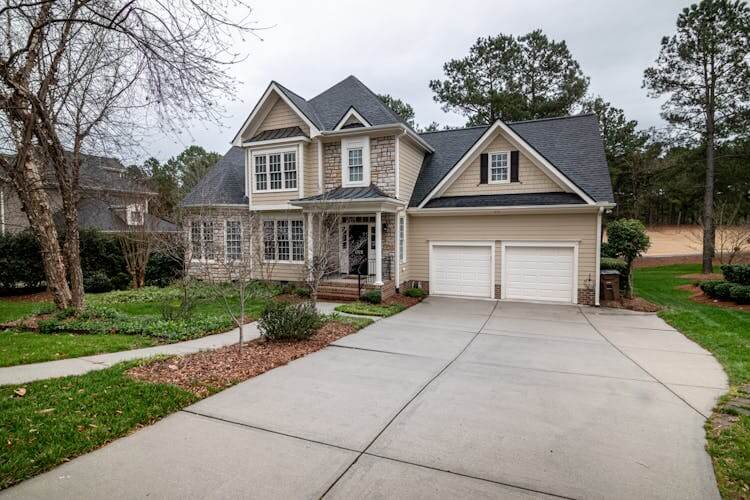Are you on the hunt for a new home? If so, securing the best mortgage deal is likely at the forefront of your mind. While scouring various mortgage lenders to find the most suitable option for you, remember to ask the right questions. By asking these best mortgage questions, you can gain a better understanding of your mortgage options and make informed decisions about your home financing.
Key Takeaways
- Asking the right questions is crucial for securing the best mortgage deal
- Understand the different types of mortgages available to choose the best one for you
- Ask your lender about the interest rate and how it impacts the overall cost of your mortgage
- Be sure to budget for closing costs and inquire about any potential penalties or prepayment fees
- Don’t hesitate to ask your lender any additional questions that come up during the process to make an informed decision
What Types of Mortgages Are Available?
Choosing the right mortgage is crucial to ensure a successful home financing experience. There are various types of mortgages available, each with its own benefits and drawbacks. Knowing the differences between them can help you make an informed decision about which one suits your needs best.
| Mortgage Type | Description |
|---|---|
| Fixed-Rate Mortgage | A mortgage with a fixed interest rate for the entire loan term. This type of mortgage provides stability and consistent monthly payments. |
| Adjustable-Rate Mortgage (ARM) | A mortgage with an interest rate that changes periodically based on market conditions. This type of mortgage provides flexibility and potential savings, but also carries more risk. |
| Federal Housing Administration (FHA) Loan | A government-backed loan for those who may not qualify for traditional mortgages. FHA loans have lower credit and income requirements, but also have mortgage insurance payments for the life of the loan. |
| Veterans Affairs (VA) Loan | A loan for eligible U.S. military veterans, service members, and their families. VA loans have no down payment requirements and are guaranteed by the Department of Veterans Affairs. |
| Jumbo Loan | A type of mortgage for homes that exceed the conforming loan limit. Jumbo loans have higher interest rates and stricter credit requirements. |
There are other mortgage options available as well, such as interest-only mortgages, balloon mortgages, and bi-weekly mortgages. It’s important to research and understand your options to make the best decision for your financial situation.
What Is the Interest Rate and How Does It Work?
When finding a mortgage, the interest rate is one of the most crucial aspects to consider. This rate determines the amount of money you will ultimately pay for borrowing the funds. Mortgages with lower interest rates typically have lower monthly payment requirements, while ones with higher interest rates will result in higher payments over time.
Interest rates are typically presented as a percentage, such as 4.5%, and can either be fixed or adjustable. A fixed interest rate remains the same throughout the mortgage loan’s life, while an adjustable rate may increase or decrease depending on certain market factors.
To determine your interest rate, lenders will consider a variety of factors, including your credit score, debt-to-income ratio, and the size of your down payment. Higher credit scores and down payments can lead to lower interest rates and ultimately lower mortgage costs.
How Does Interest Work?
Interest on your mortgage is calculated each month based on the remaining balance of your loan and the interest rate that has been agreed upon. At the beginning of the mortgage, the majority of the monthly payment will go towards the interest, with less going towards the principal balance. Over time, the proportion will gradually shift, so more of the payment will begin to go towards the principal balance. This shift is known as amortization.
It’s crucial to keep an eye on the mortgage interest rate, as even a small difference can result in significant savings over the life of your loan. Do some research to determine what rates are currently available and explore different lenders to find the best deal for you.
What Are the Closing Costs?
When purchasing a house, it’s important to know that there will be additional expenses besides the cost of the property. These expenses are known as closing costs. Essentially, closing costs are fees associated with processing your mortgage and transferring ownership of the property to you.
Typically, closing costs can range from 2% to 5% of the total loan amount. Depending on a variety of factors, these costs can include:
| Expense | Description |
|---|---|
| Appraisal fee | Fee for assessing the property’s value |
| Underwriting fee | Fee for reviewing and evaluating your loan application |
| Title insurance fee | Fee for guaranteeing the property’s title is clear for sale |
| Origination fee | Fee for processing and starting your mortgage application |
| State and local taxes | Taxes associated with transferring the property to you |
It’s important to keep in mind that every mortgage situation is unique, and as such, your closing costs may be different from those listed here. Make sure to speak with your lender to fully understand what closing costs will be associated with your mortgage.
Being aware of the closing costs is an essential part of the home financing process. Make sure to budget accordingly to avoid any surprises at the end. By understanding what the different expenses are, you can ensure a smooth and successful home purchase process.
Are There any Penalties or Prepayment Fees?
When reviewing mortgage options, it’s essential to consider any potential penalties or fees associated with paying off your mortgage early or making additional payments. Some lenders may charge prepayment fees or impose mortgage penalties for early repayment. These fees can add up and significantly increase the overall cost of your mortgage.
There are different types of mortgage penalties, such as:
| Type of Penalty | Explanation |
|---|---|
| Prepayment Penalty | A predetermined fee charged by your lender if you pay off your mortgage before the end of the term. |
| Interest Rate Differential Penalty (IRD) | A penalty calculated as the difference between your mortgage interest rate and the lender’s current rate. This penalty applies if you break your mortgage agreement to refinance or sell your home. |
| Porting Penalty | Some lenders charge a fee for porting your mortgage to a new home. Porting means transferring your existing mortgage to a new property and combining it with additional financing, if necessary. |
Penalties can vary widely according to the lender and mortgage type, so it’s crucial to ask your lender about any potential fees upfront. While it’s not always possible to avoid these fees, understanding them and factoring them into your budget can help you make an informed decision that suits your financial goals.
Conclusion
Now that you know which mortgage questions to ask your lender, you can approach the home financing process with confidence. By understanding the different types of mortgages available, the interest rate and how it works, the closing costs, and potential penalties or prepayment fees, you can make informed decisions and secure the best mortgage deal for you. Remember, don’t hesitate to ask your lender any additional questions or for clarification throughout the process. Your understanding of the terms and agreements is crucial for a successful home financing experience. Good luck with finding your dream home!
FAQ
What are some important mortgage questions to ask your lender?
Asking your lender the right questions is crucial when it comes to understanding your mortgage. Here are some key questions to ask: 1. What is the interest rate? 2. What are the closing costs? 3. Are there any penalties or prepayment fees? 4. How long is the loan term? 5. What type of mortgage is best for my situation? 6. What are the monthly payments and how are they calculated? 7. Can I lock in the interest rate? 8. Are there any special programs or incentives available? 9. How long will the mortgage approval process take? 10. What documentation do I need to provide?
What types of mortgages are available?
There are several types of mortgages available, including: 1. Fixed-rate mortgages, where the interest rate remains the same throughout the loan term. 2. Adjustable-rate mortgages (ARMs), where the interest rate may fluctuate over time. 3. FHA loans, which are insured by the Federal Housing Administration and often require a lower down payment. 4. VA loans, which are available to eligible veterans and typically offer favorable terms. 5. USDA loans, which are designed for rural areas and offer low-interest rates. 6. Jumbo loans, which are for higher-priced properties that exceed the conventional loan limits.
What is the interest rate and how does it work?
The interest rate is the percentage charged by the lender for borrowing the money. It determines the cost of borrowing and affects your monthly mortgage payments. The interest rate can be fixed or adjustable. With a fixed-rate mortgage, the interest rate remains the same throughout the loan term, while with an adjustable-rate mortgage (ARM), the rate may change periodically.
What are the closing costs?
Closing costs are fees and expenses associated with finalizing the mortgage loan. They typically include costs such as appraisal fees, title insurance, attorney fees, loan origination fees, and prepaid expenses like property taxes and homeowners insurance. It’s important to understand the closing costs upfront to avoid any surprises at the end of the home financing process.
Are there any penalties or prepayment fees?
Some mortgage agreements may have penalties or prepayment fees associated with paying off the mortgage early or making additional payments. It’s important to clarify with your lender whether there are any such fees and understand the terms and conditions surrounding them.



